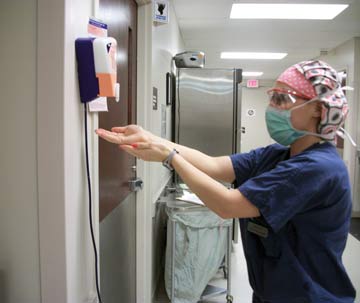Elective surgeries are back on the schedule and staff are returning under new circumstances and different expectations. As you begin to perform procedures amid the uncertainty the coronavirus pandemic has created, here are a few concrete steps you can take to make sure staff members are protected from exposure and treated fairly in the eyes of the law.
- Safety violations. The U.S. Occupational Safety and Health Administration (OSHA) hasn't implemented COVID-19-specific guidelines, but you still must follow OSHA mandates to keep employees safe from recognized hazards that could cause serious harm or even death. Start with the simple things that might sound obvious, but, put together, add up to a great starting point to maintaining safe workspaces in the COVID-19 era. Post signs that remind staff, patients and visitors to follow 6-foot social distancing practices. Signage should also remind staff to wash their hands for 20 seconds periodically throughout the day.
Have plenty of hand sanitizer and disinfectant wipes available. Invest heavily in cleaning supplies. Clean the break room, door handles and light switches daily — and throughout the day, if possible. Establish enhanced cleaning protocols and ensure staff follow them.
You might find that some employees will refuse to report for work because of fears they have about being exposed to the coronavirus. Ask them for additional ideas that would make them feel safe — and implement them. If they still don't want to come to work, implement your absentee protocols: Give a written warning and a final warning before termination.
Whenever possible, continue holding team or leadership meetings in the virtual realm, even after your facility reopens. Online meetings worked very well in many industries, and continuing them with employees in the same building should be a common practice under the current circumstances. Workstations might have to be reconfigured, or new barriers might need to be installed — at the patient registration area, for example — in order to abide by social distancing protocols and limit exposure risks. If possible, consider staggering shifts to limit the number of employees in the facility at the same time. Formalize social distancing practices as policy, communicate to the staff why the policies are important and explain how they're going to be implemented.
.svg?sfvrsn=be606e78_3)

.svg?sfvrsn=56b2f850_5)